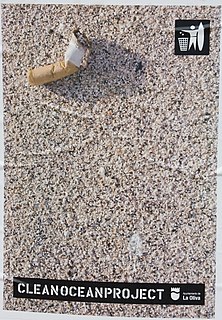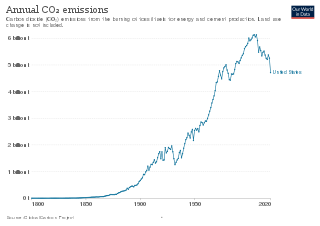Dispute resolution or dispute settlement is the process of resolving disputes between parties. The term dispute resolution is sometimes used interchangeably with conflict resolution, although conflicts are generally more deep-rooted and lengthy than disputes. Dispute resolution techniques assist the resolution of antagonisms between parties that can include citizens, corporations, and governments.

The Natural Resources Defense Council (NRDC) is a United States-based 501(c)(3) non-profit international environmental advocacy group, with its headquarters in New York City and offices in Washington D.C., San Francisco, Los Angeles, New Delhi, Chicago, Bozeman, and Beijing. Founded in 1970, as of 2019, the NRDC had over three million members, with online activities nationwide, and a staff of about 700 lawyers, scientists and other policy experts.

The Environmental Protection Agency (EPA) is an independent executive agency of the United States federal government tasked with environmental protection matters. President Richard Nixon proposed the establishment of EPA on July 9, 1970; it began operation on December 2, 1970, after Nixon signed an executive order. The order establishing the EPA was ratified by committee hearings in the House and Senate. The agency is led by its administrator, who is appointed by the president and approved by the Senate. The current administrator is Michael S. Regan. The EPA is not a Cabinet department, but the administrator is normally given cabinet rank.

Environmental protection is the practice of protecting the natural environment by individuals, organizations and governments. Its objectives are to conserve natural resources and the existing natural environment and, where possible, to repair damage and reverse trends.
The Small Business Liability Relief and Brownfields Revitalization Act was signed into law by President George W. Bush on January 11, 2002. Brownfields are defined as, "A former industrial or commercial site where future use is affected by real or perceived environmental contamination." The Brownfields Law amended the Comprehensive Environmental Response, Compensation, and Liability Act by providing funds to assess and clean up brownfields, clarifying CERCLA liability protections, and providing funds to enhance state and tribal response programs. Other related laws and regulations impact brownfields cleanup and reuse through financial incentives and regulatory requirements.

United States environmental law concerns legal standards to protect human health and improve the natural environment of the United States. While subject to criticism at home and abroad on issues of protection, enforcement, and over-regulation, the country remains an important source of environmental legal expertise and experience.

The Morris K. Udall and Stewart L. Udall Foundation is an Executive Branch office of the United States Government. The Foundation was established by the Congress in 1992 to honor Morris Udall's thirty years of service in the House of Representatives. Congress amended the name in 2009 to include Stewart Udall, in recognition of his public service. The full official name of the Foundation is Morris K. Udall and Stewart L. Udall Scholarship and Excellence in National Environmental Policy Foundation. The President of the United States appoints its board of trustees with the advice and consent of the Senate.

The Texas Commission on Environmental Quality (TCEQ) is the environmental agency for the state of Texas. The commission's headquarters are located at 12100 Park 35 Circle in Austin. The fourth largest environmental agency in the United States, it employs approximately 2,780 employees, has 16 regional offices, and has a $420 million operating budget for the 2016 fiscal year.

The United States Department of Justice Environment and Natural Resources Division (ENRD) is one of seven litigating components of the U.S. Department of Justice. ENRD's mandate is to enforce civil and criminal environmental laws and programs protecting the health and environment of the United States, and to defend suits challenging those laws and programs.
The Mutual Gains Approach (MGA) to negotiation is a process model, based on experimental findings and hundreds of real-world cases, that lays out four steps for negotiating better outcomes while protecting relationships and reputation. A central tenet of the model, and the robust theory that underlies it, is that a vast majority of negotiations in the real world involve parties who have more than one goal or concern in mind and more than one issue that can be addressed in the agreement they reach. The model allows parties to improve their chances of creating an agreement superior to existing alternatives.

The environmental policy of the United States is a federal governmental action to regulate activities that have an environmental impact in the United States. The goal of environmental policy is to protect the environment for future generations while interfering as little as possible with the efficiency of commerce or the liberty of the people and to limit inequity in who is burdened with environmental costs. As his first official act bringing in the 1970s, President Richard Nixon signed the U.S. National Environmental Policy Act (NEPA) into law on New Years Day, 1970. Also in the same year, America began celebrating Earth Day, which has been called "the big bang of U.S. environmental politics, launching the country on a sweeping social learning curve about ecological management never before experienced or attempted in any other nation." NEPA established a comprehensive US national environmental policy and created the requirement to prepare an environmental impact statement for “major federal actions significantly affecting the quality of the environment.” Author and consultant Charles H. Eccleston has called NEPA, the world's “environmental Magna Carta”.
Leonard J. Marcus is an American social scientist and administrator. He is director of the Program for Health Care Negotiation and Conflict Resolution at the Harvard T.H. Chan School of Public Health at Harvard University, and founding co-director of the National Preparedness Leadership Initiative, a joint program of the Harvard T.H. Chan School of Public Health and the Center for Public Leadership at Harvard's Kennedy School of Government.

Henry P. Caulfield Jr. was an American political scientist who had a long and distinguished career in public service with the U.S. Department of the Interior, culminating as the first director of its U.S. Water Resources Council, before becoming professor of political science at Colorado State University. He served on many boards and advisory committees and as a consultant to water resources agencies worldwide, and received awards for his service. Caulfield was born in New York City, and died in Fort Collins, Colorado, where he retired in 1986.
Traditional ecological knowledge (TEK) describes indigenous and other traditional knowledge of local resources. As a field of study in Northern American anthropology, TEK refers to "a cumulative body of knowledge, belief, and practice, evolving by accumulation of TEK and handed down through generations through traditional songs, stories and beliefs. It is concerned with the relationship of living beings with their traditional groups and with their environment." It is important to note that indigenous knowledge is not a universal concept among various societies, but is referred to a system of knowledge traditions or practices that are heavily dependent on "place". Such knowledge is used in natural resource management as a substitute for baseline environmental data in cases where there is little recorded scientific data, or may complement Western scientific methods of ecological management.

Lawrence E. Susskind is a teacher, trainer, mediator, and urban planner. He is one of the founders of the field of public dispute mediation and is a practicing international mediator through the Consensus Building institute. He has taught at the Massachusetts Institute of Technology since 1971.
The Virginia Governor's Cabinet is a body of the most senior appointed officers of the executive branch of the government of Virginia. The Cabinet is responsible for advising the Governor of Virginia. Cabinet officers are nominated by the Governor and then presented to the Virginia General Assembly for confirmation. Once confirmed, all members of the Cabinet receive the title "Secretary" and serve at the pleasure of the Governor.

The Arctic policy of the United States is the foreign policy of the United States in regard to the Arctic region. In addition, the United States' domestic policy toward Alaska is part of its Arctic policy.
The Reagan-Udall Foundation is a private nonprofit (501c3) organization, created to support the mission of the U.S. Food and Drug Administration (FDA) to help equip FDA staff with the highest caliber, regulatory science and technology in order to enhance the safety and effectiveness of FDA regulated products. Although it was mandated by Congress in the Food and Drug Administration Amendments Act of 2007 to help support and promote FDA's regulatory science priorities, it is independent of the agency, with its own Board of Directors, staff and research agenda. The Reagan-Udall Foundation creates public-private partnerships to advance research in regulatory science, enhance medical decision making, and promote innovation. It also advances regulatory science through fellowships and other training programs, both for private scientists and for FDA staff.
Collaborative partnerships are agreements and actions made by consenting organizations to share resources to accomplish a mutual goal. Collaborative partnerships rely on participation by at least two parties who agree to share resources, such as finances, knowledge, and people. Organizations in a collaborative partnership share common goals. The essence of collaborative partnership is for all parties to mutually benefit from working together.

The Institute for Policy Integrity is a non-partisan think tank housed within the New York University School of Law. Policy Integrity is dedicated to improving government decisionmaking, and its primary area of focus is climate and energy policy. Policy Integrity produces original scholarly research and advocates for reform before courts, legislatures, and executive agencies at both the federal and state level.